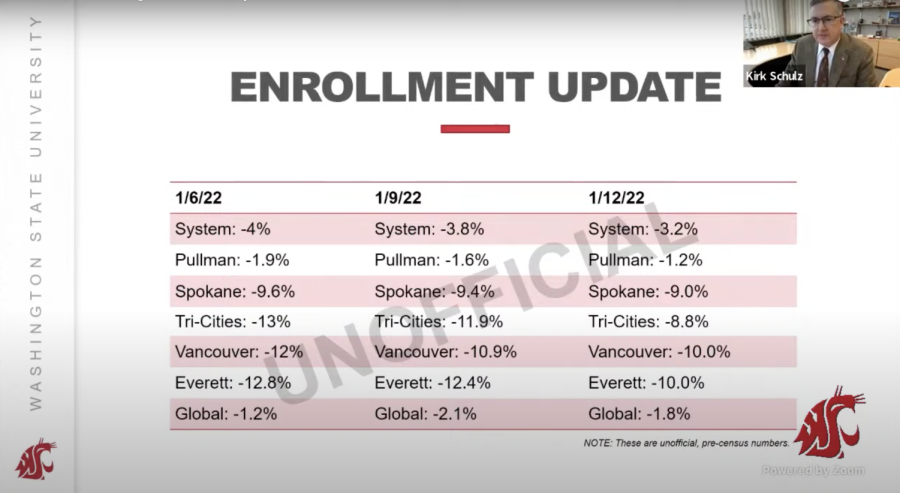- Administration
- COVID-19
- News
- TOP FEATURES
- WSU Everett
- WSU Pullman campus
- WSU Spokane
- WSU Tri-Cities
- WSU Vancouver
Board of Regents to vote on tuition hike later this spring
Board considers impact on non-resident students, state laws; enrollment decreases across campuses
As enrollment decreases, the Board of Regents plans to increase tuition later this spring.
January 24, 2022
Editors note: This story has been revised to accurately reflect the voting decision regarding parking rates and fines.
At their meeting this week, the Board of Regents proposed a 2.5% increase in tuition for the 2022-2023 academic year for undergraduate, graduate and non-resident students.
The proposed increase will be voted on in May. Until then, the board will consider the impacts of the tuition increase on non-resident students and identify funds that students can access to offset the new cost.
Washington laws restrict the tuition increases that WSU can implement, so the board will continue to follow the legislative guidance on this issue until May.
Action Items
The board voted to delegate power to the WSU president to increase parking rates and fines for all campuses. The current fine amounts can be found through the WSU Transportation Services Fine Schedule.
The fine rates may be increased up to an average of 10% across parking permit types, with some fines increasing up to $50, according to the Board of Regents meeting documents.
The board also approved a project budget increase of $2.7 million for the Life Sciences Building at WSU Vancouver, increasing the budgeted amount for the project to $59.8 million.
The board voted to rename the Indoor Practice Facility to the Taylor Sports Complex. The Taylor family donated $7 million to the project, which is still under development.
The board also voted to discontinue the Bachelor of Arts in Interior Design at WSU Spokane and add a Bachelor of Arts in Chemistry to the WSU Vancouver campus. They also renamed the master’s and doctoral degrees in “Veterinary Sciences” to “Biomedical Sciences.”
Reports
In his report to the board, President Kirk Schulz said that public universities across the country have been struggling with enrollment. WSU’s system is down about 1,000 students from where it was a year ago, he said.
While WSU is seeing a spike in COVID-19 cases, Schulz said he wants to keep as many experiences in-person as possible.
“To date, we have had zero transmission in any classroom and learning environment,” he said. “Where we have transmission issues, typically, is in housing-related things or after-hours activities — not within the classroom, the classroom environment is still very safe.”
In January, enrollment at the Everett and Vancouver campuses decreased 10% from last spring; however, there has been a 24% growth in applications coming in for the fall semester, said WSU Everett Chancellor Paul Pitre.
The faculty senate reported a temporary suspension of Rule 38B, which said that first-time, first-year undergraduate students will be recessed from WSU if their semester GPA is below 1.0.
The policy was originally intended to catch students who were not ready for the responsibility of college, but the faculty senators decided that students may be negatively affected by this during the pandemic. Students who may need more help should not be recessed, Senate Chair Doug Call said.











